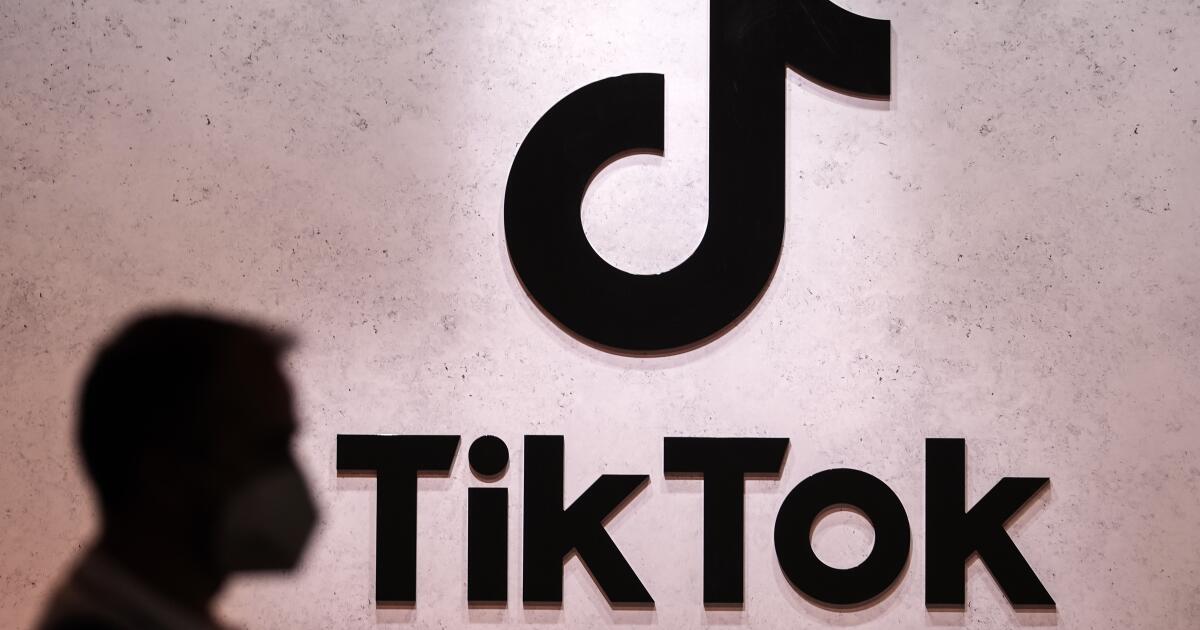TikTok’s future in the U.S. is now in greater jeopardy after the popular social video app lost a major court battle Friday as it tries to prevent its banishment.
TikTok sued the government in May, asking the U.S. Court of Appeals to declare unconstitutional a law that would require its Chinese parent company, ByteDance, to divest TikTok’s U.S. operations or face a ban in the country.
Legislators backing the law said a ban or sale was necessary to address national security concerns posed by the app’s ties to China.
The law, signed by President Biden, is set to go into effect Jan. 19.
TikTok had said in its lawsuit that the law violated its 1st Amendment rights to free speech. The company contended that the law “offers no support for the idea” that its Chinese ownership poses national security risks.
More than 170 million Americans use the video app, on which people share dance routines, cooking tips, funny videos and news stories.
“On the merits, we reject each of the petitioners’ constitutional claims,” Judge Douglas Ginsburg wrote in the court’s decision issued Friday.
“The First Amendment exists to protect free speech in the United States,” Ginsburg wrote. “Here the Government acted solely to protect that freedom from a foreign adversary nation and to limit that adversary’s ability to gather data on people in the United States.”
Legal experts said they expect TikTok will appeal its case to the Supreme Court. It is also possible that Biden could offer ByteDance an extension for divesting, but some experts said that is unlikely.
“The Supreme Court has an established historical record of protecting Americans’ right to free speech, and we expect they will do just that on this important constitutional issue,” TikTok spokesman Michael Hughes said in a statement. “Unfortunately, the TikTok ban was conceived and pushed through based upon inaccurate, flawed and hypothetical information, resulting in outright censorship of the American people.”
Carl Tobias, a law professor at the University of Richmond, said TikTok could ask the court to put a hold on the ruling until the Supreme Court hears its case.
“They still have another shot with the Supreme Court,” he said. “It’s an important issue. It’s a difficult one, and it affects a lot of Americans, foreign policy and national security. If it’s a matter of [the Supreme Court’s] interest in it, I expect that interest would be high.”
U.S. Atty. Gen. Merrick Garland welcomed the ruling, saying the court’s decision affirms that the TikTok legislation is consistent with the Constitution.
“Today’s decision is an important step in blocking the Chinese government from weaponizing TikTok to collect sensitive information about millions of Americans, to covertly manipulate the content delivered to American audiences, and to undermine our national security,” Garland said in a statement.
President-elect Donald Trump had campaigned on supporting TikTok, despite having pushed for a ban during his first term.
“We’re not doing anything with TikTok,” he said on a video posted on social media this year.
The Trump transition team did not immediately respond to a request for comment.
Trump’s statements in support of TikTok have given creators some hope, though it’s not clear what action his administration will take. The ban would go into effect the day before Trump takes office.
Once Trump is in the White House, he has a couple of options. He could attempt to sway Congress to modify or repeal the law; instruct his administration to not enforce the law; or direct the Department of Justice to not defend the government in TikTok’s lawsuit if it goes to the Supreme Court.
Some legal experts also theorized that Trump could try to grant ByteDance a 90-day extension on its divestiture, even though the law would already be in effect.
“Ultimately, the President’s options may be limited,” said Anthony Rapa, a Washington, D.C.-based partner and co-chair of law firm Blank Rome’s international trade practice.
A ban on TikTok could affect the livelihoods of many Southern California video creators who post content on the platform and make a lot of money doing so. Many of those influencers over the years have diversified where they post their content to prepare for a potential ban.
Sabrina Mercado, 21, is a full-time content creator from Downey. She created her TikTok in 2019 and today has 459,000 followers on the platform.
About a year ago, Mercado briefly considered creating a press-on nail business and selling on TikTok Shop, the company’s e-commerce platform, but hesitated.
“If TikTok were to be banned, what would happen to business?” she said. “It just makes things riskier.”
Mercado now posts on Instagram, TikTok, YouTube and Snapchat, with Instagram being her main focus.
Since joining TikTok five years ago, Joey Soboleski II has grown his following to more than 403,000 people on the app. The full-time content creator from Glendale posts comedy and lifestyle content, and said he is not concerned about a ban hurting his reach.
“I built a platform on Instagram that’s bigger than TikTok and I think the viewership will go over to Instagram honestly or YouTube or both,” Soboleski, 26, said. “And then the money will go over.”
Los Angeles lifestyle content creator Noelle Hear, 20, said she has grown less attached to TikTok over the last few years as the app’s fate has been up in the air.
“I will definitely miss the app in the sense that I think it’s very informative and it’s a great way for anyone to become a content creator,” she said about a potential TikTok ban. “At the same time, I do think that Instagram Reels will become TikTok.”
